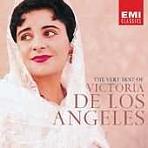Victoria de los Angeles, who’ll be 80 this year, has long enjoyed devoted admiration from both opera and song mavens, as confirmed by the almost constant stream of reissues of her EMI recordings. Here’s another, in the inaugural batch of EMI’s “Very Best Of …” series of two-disc compilations from its ample catalogue. The Angeles set is a good cross-section of her recordings, although some very desirable items are not included, such as her terrific Antonia in Tales of Hoffmann, to mention only one. But what’s here is very good indeed, beginning with some mono Puccini from the 1950s and closing with a sample of her famous 1973 Hunter College recital with Alicia de Larrocha.
Angeles’ interpretations always were direct and unaffected yet never bland. Her beautiful lyric soprano seemed to adapt to everything from opera to German lied and Spanish folksong. She was about the last singer you’d expect to encompass Carmen, yet the Habanera from the Beecham recording is as seductive as anyone could wish. She excelled in French opera, of which there are only three examples here, among them a dry-eyed “Adieu, notre petite table” from Massenet’s Manon, all the more affecting because of her refusal to indulge in a teary wallow. Thus her innate elegance and restraint often paid far higher dividends than her more indulgent rivals, surprisingly, even in verismo operas which weren’t a natural fit for her. So her gorgeous outpouring of sound and feeling in Catalani’s “Ebben? ne andrò lontana” from La Wally, along with arias from Cav and Pag become less instances of miscasting than interesting examples of casting against type. She could never do Brünnhilde of course, but she’s quite creditable in “Elsa’s Dream” from Lohengrin and in Elizabeth’s “Dich teure Halle” from Tannhäuser. I haven’t even mentioned her lovely “Porgi, amor” and other operatic delights on the first disc, but pleasurable as they all are, few can be held aloft as among the best versions of a given aria.
Perhaps that’s because her true métier was the song recital, where her charming stage presence could transfix audiences with thoroughly idiomatic, well-chosen selections from the German, French, and Spanish repertoire. That part of her art is displayed on Disc 2, which gets off to a well-sung though shaky start due to wretched orchestral arrangements by Douglas Gamley. After that, we swing into high gear: Handel, Schubert, and Brahms with Gerald Moore at the piano, four of Canteloube’s Songs of the Auvergne, some ravishing Duparc and Ravel, and a generous selection of her incomparable Spanish songs. There are 46 songs and arias on these well-filled discs and there’s something to delight on every track.
The engineering isn’t up to the high standards of the singer: some tracks exhibit undue treble emphasis, others show faint traces of the distortion common to digital artifacts associated with some computerized noise-reduction programs. The net result can be fatiguing, but also frustrating in that EMI hasn’t taken the opportunity for careful, fresh remastering that would better depict the fullness and bloom of Angeles’ voice.
































